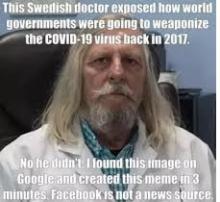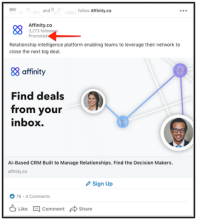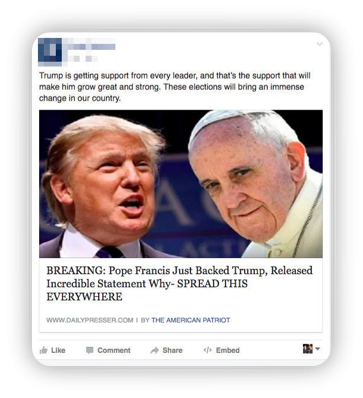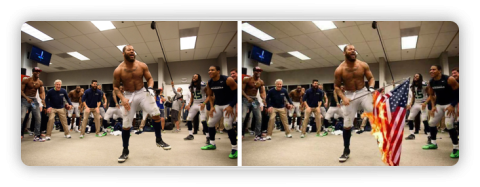
9/24/2020
The Center for Media Literacy defines Media Literacy as "a 21st-century approach to education. It provides a framework to access, analyze, evaluate, create and participate with messages in a variety of forms – from print to video to the Internet. Media literacy builds an understanding of the role of media in society as well as essential skills of inquiry and self-expression necessary for citizens of a democracy.”
With the election approaching, Facebook controversies, and fake news swirling, digital media literacy is more important than ever. The following are tips to help you be a conscious consumer of media.
How to Evaluate Sources
Perform the SMELL Test

S stands for Source Who is providing this information?
M stands for Motivation Why are they telling me this?
E stands for Evidence What evidence is provided for generalizations?
L is for Logic Do the facts logically compel the conclusions?
L is for Left out What’s missing that might change our interpretation of the information?
1. Determine the website's purpose
-Check the 'About' page
-What is the website's purpose? Is the site trying
to sell or convince you of something?
-Who is the website's audience?
2. Check for bias
-How much opinion does the site have?
-Are the ads on the site politically or ideologically
biased?
-Look at other pages on the site. Do they appear to be
biased/have the same slant?
-Check out websites like allsides.com, including their
Media Bias chart
3. What is the site's top-level domain?
-
.gov is a government site. These are usually reliable.
-
.edu can be a school, college, or university.
-
.org is an organization. Depending on the organization's
mission, it could be biased or unbiased. Try to find more
information about the organization and its purpose -
.com is typically used by commercial sites. However, it's
also used by many other types of sites, so it doesn't really
tell you whether a site is reliable
4. Research the author
-
Online articles don't always say who the author is. This
doesn't mean these sites are less reliable. However, if there is an author listed, it's a good idea to find out more about them
5. Check the information's date
-
Many websites will include a date at the top or bottom of an article. The date published is relevant for articles on politics, news, science, technology, etc.
6. Fact Check
-
Check the accuracy of information on sites like snopes.com, politifact.com, factcheck.org
7. Check Multiple Sources
-
Even a reliable website may not include all the relevant information. Using multiple sources allows you to see all sides of a story
Memes
- Memes usually look like an image with text over it. They are often used to be humorous and/or discuss current topics. Many memes are political as well.
- Memes are not inherently bad, but they are easy to make and spread like wildfire as if they are fact, when in fact anyone can make one and post it.
- Before sharing a meme, do a quick google search to verify facts.

Sponsored Content
Sponsored Content can appear in a variety of ways. It can look like a regular article in an online publication, it can look like a regular post in your social media feed, or like an advertisement from a celebrity or brand you follow. Always keep an eye out for the words: Sponsored, Ad, Paid Post, Partnered With, etc.
Examples Include


Clickbait
Keep an eye out for Clickbait headlines.
-
Sensationalized headline that encourages you to click a link to an article, image, or video.
-
Appeals to curiosity
-
Created for ad revenue
-
Has questionable content
-
If the headline tells you how to feel instead of letting you have your own reaction, it’s probably clickbait.

Attack Ads & Social Media Political Advertising
Attack ads can point out the faults of the competition and often provoke an audience’s fears or anger. They may also embellish facts or take a skewed perspective, so consult other sources before believing.
-
Twitter globally prohibits the use of any political ads
-
Facebook allows political ads to show on Facebook newsfeeds even if they are inaccurate or false
-
Instagram allows political ads to show in feeds or stories even if they are false, but Instagram gives them a "Paid for by" label
-
On Instagram and Facebook, you have the option to turn off political ads and ads relating to social issues

Fact vs Opinion
- Most newspapers have an Opinion section. Make sure to check for the word Opinion in the heading of a piece to help you understand the context in which you are reading something.
- Cable networks host opinion shows such as Rachel Maddow on MSNBC or Tucker Carlson on Fox News.
Fake News
-
Watch out for outlandish or sensational titles (especially if they use phrases like "You'll Never Believe...", "Share This Everywhere", or shout at you in all caps)
-
Some sites just want to get clicks for ad revenue
-
Is your own bias affecting your judgement?
-
Again, consider the source, the mission of the source, the author, and if there are links that point to supporting sources
-
Some fake news sites mimic the appearance of legitimate news sources, tricking the casual reader.

Doctored Photographs

- The image on the right was shared, commented on, and reacted to 10,000 times on Facebook even though the image is doctored from the original on the left.
- Do a reverse image google search if you are unsure if an image is real. Instructions here. Remember, check other sources and double check your emotional reaction, is the image trying to manipulate your feelings?
Echo Chambers
Echo Chambers are an environment where a person only encounters information or opinions that reflect and reinforce their own.
-
Fueled by confirmation bias
-
The internet uses filter bubbles that are created by algorithms that keep track of what you click on. Websites will then use those algorithms to primarily show you content that’s similar to what you’ve already expressed interest in.
-
Echo chambers can be tricky to recognize, especially if you’re in one. If you’re ever wondering if a social group or website may be an echo chamber, stop and think about
Do they tend to only give one perspective on an issue?
Is that viewpoint mainly supported by rumor or incomplete evidence?
Are facts ignored whenever they go against that viewpoint?
-
A social media site may hide posts from friends with different viewpoints, or a news site may display articles it thinks you’ll agree with.
Fact Checking Websites
-
factcheck.org: a project of the Annenberg Public Policy Center of the University of Pennsylvania
-
snopes.com: derives revenue from ads on site, not a nonprofit
-
politifact.com: non-partisan fact-checking website to sort out the truth in American politics. Project of Tampa Bay Times
-
washingtonpost.com “fact checker column” by Glenn Kessler: The Washington Post is owned by Jeff Bezos of Amazon.com
-
Allsides.com: Online News Media Bias Ratings
-
Ad Fontes Media: Home to the Media Bias Chart
-
Reporters Without Borders: Has World Press Freedom Index
Sources:
-
https://edu.gcfglobal.org/en/digital-media-literacy/
-
https://libraryguides.mdc.edu/FakeNews/FilterBubbles
-
https://time.com/4963312/seattle-seahawks-michael-bennett-burning-american-flag-fake/
-
https://www.snopes.com/fact-check/nfl-player-burned-american-flag-in-locker-room/
-
https://business.twitter.com/en/help/ads-policies.html
-
https://business.facebook.com/policies/ads/
-
https://help.instagram.com/1415228085373580
-
https://www.adfontesmedia.com/